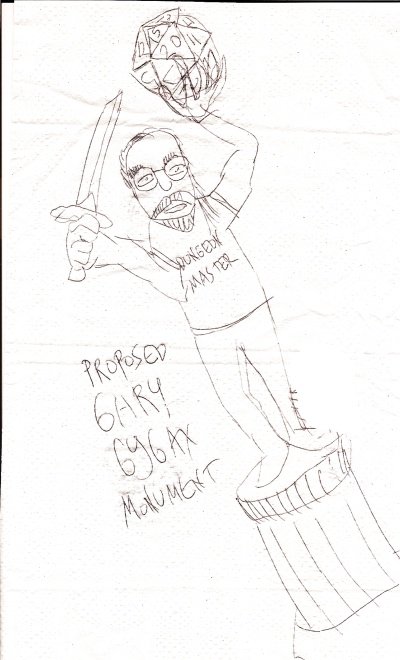Do. Or do not! There is no try: Part 1
 Instead of quoting Bible passages, my family quoted Star Wars.
Instead of quoting Bible passages, my family quoted Star Wars.
The X-wing fighter has sunk, and only the tip of its nose shows above the lake's surface.
LUKE: Oh, no. We'll never get it out now.
Yoda stamps his foot in irritation.
YODA: So certain are you. Always with you it cannot be done. Hear you nothing that I say?
Luke looks uncertainly out at the ship.
LUKE: Master, moving stones around is one thing. This is totally different.
YODA: No! No different! Only different in your mind. You must unlearn what you have learned.
LUKE: (focusing, quietly) All right, I'll give it a try.
YODA: No! Try not. Do. Or do not!! There is no try....
The lines above are from the screenplay to The Empire Strikes Back, the second of the first trilogy of Star Wars movies, aka Episode V. Many of us who originally saw the 1980 film back in the theater fondly remember this scene in the swamps of Dagobah featuring the grumpy and whiny student, Luke Skywalker, and his impatient, diminutive, Kermit the Frog-like teacher, Yoda.
Now, insert brother and sister into their roles and you have some idea of my childhood fantasy life. Instead of quoting Bible passages for spiritual guidance, sometimes my family quoted Star Wars.
Recall the wonder of the Force, this arcane and powerful energy field that filmmaker George Lucas proposed as a kind of religious rubber cement that held together his universe. In the words of Yoda, the Force "surrounds us and binds us. ... Here, between you...me...the tree...the rock...everywhere!" For a skeptic like me, neither raised in a religious home nor educated about Christianity, Judaism, Buddhism or anything else even marginally spiritual, the Force seemed like a cool and even plausible explanation for not only what might bind together a galaxy far, far away, but my small and mundane world in rural New Hampshire. To heathens like me, the Force made a lot more sense than the Holy Trinity.
It's easy to dismiss science fiction and other genre movies (and books, and games) as mindless entertainment. But the reason for the popularity of Star Wars, Twilight and Lord of the Rings can't simply be that our culture craves vapid adventure stories to while away the idle hours. I think we consume these modern epics because, for many of us, traditional institutions don't cut it anymore. Church, family and government once handed over fairly rigid instructions on "how to live": how to be a good citizen, neighbor, spouse or parent. The cultural revolution of the 1960s and 1970s changed all that. Vietnam, political assassinations, government corruption, and the rise of the corporate state left us suspicious of conventional authority and religion. We got jaded.
Is it no wonder, then, that many now seek moral guidance and spiritual example not in mosques and chapels, but huddled in darkened movie theaters or bathed in the holy glow of our Blu-rays? Our new gods and priests might be writers, movie directors and actors. When, in Lord of the Rings, Sir Ian McKellen as Gandalf the wise intones to Frodo, "All we have to decide is what to do with the time that is given to us," it's hard not to prick up our hobbity ears and nod our heads in agreement. Yes, that's damned good advice. And for many of us, it's guidance much easier to swallow than the kind shouted from the pulpit on a Sunday morning.
Ethan Gilsdorf is the author of the new travel memoir Fantasy Freaks and Gaming Geeks: An Epic Quest for Reality Among Role Players, Online Gamers, and Other Dwellers of Imaginary Realms.
Even the smallest person can change the course of the future
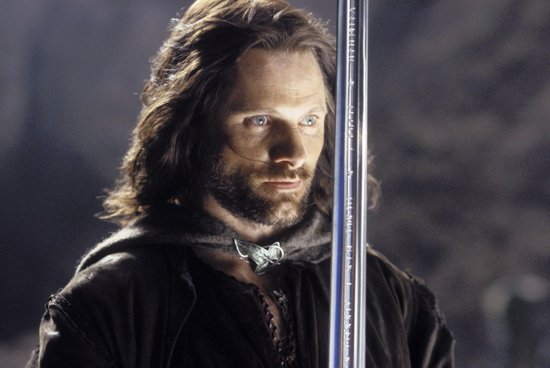 In fantasy, heroes do things we can’t do in real life
In fantasy, heroes do things we can’t do in real life
Several days ago, I attended a special screening at New York City's Radio City Music Hall of the first movie in the Lord of the Rings trilogy, The Fellowship of the Ring. What made the event unique was the accompaniment by a live orchestra and choir, some 300 musicians in total, who played Howard Shore's rousing and moody score in front of the hall's massive screen. Suffice it to say, fans of J.R.R. Tolkien were pleased. Some even dressed the part as Gandalf and Frodo; others, whether in their night-at-the-opera best or street clothes, merely resembled hobbits and wizards in their stature or generous facial hair.
Unlike most movie screenings, where the audience usually remains respectfully silent (well, most of the time), here the audience felt free to let loose. When each of the major characters appeared on screen --- Elijah Wood as Frodo, Sean Astin as Samwise, Viggo Mortensen as Strider/Aragorn, Orlando Bloom as Legolas --- the audience erupted in cheers and clapping. Most fans had seen the Fellowship before, and I suspect many has seen it several or even a dozen times (like me). But that didn't matter.
We watch fantasy movies with heroic characters for plenty of reasons: because they're fun, because they're exciting, because we need to tune out and decompress for a couple of hours, or because they show us places and creatures that could never be. But one essential reason Tolkien's world, Middle-earth, is so appealing --- particularly the richly-imagined version brought to life by director Peter Jackson and composer Howard Shore --- is that its heroes do things we can't do in real life. They fight the good fight, and slay the evil orcs and goblins and uruk-hai. They take risks. They behave as we might want to: with bravery, honor, and sacrifice.
The plots of Lord of the Rings and its ilk are as old as The Iliad and Beowulf. But the feelings of being empowered are renewed each time we read or watch these epic stories of triumph and derring-do. Moreover, they inspire us. As I sat there for three and a half hours, watching a familiar quest story that has become, in the words of Gollum, "precious" to me, I realized why these tales of hobbits and magic rings and an malicious power have power over us. They remind us again, as the cliché goes, "what is worth fighting for." It comes down to that line of dialogue uttered by the elf queen Galadriel (played by the ethereal Cate Blanchett), "Even the smallest person can change the course of the future." If a three-foot hobbit can learn to wield sword, face down evil, and emerge victorious, perhaps you and I can find courage to face down our own problems and challenges, no matter how small in comparison.
Ethan Gilsdorf is the author of the new travel memoir Fantasy Freaks and Gaming Geeks: An Epic Quest for Reality Among Role Players, Online Gamers, and Other Dwellers of Imaginary Realms.
Pop Ten blog
Ran across this site today --- PopTen "top ten lists and pop culture rants" --- bits like "Top Ten Wi-Fi Connection Names" and "Top 4 reasons NOT to date a European (+ one reason to date a British dude if you must)." And,some nice words about "Fantasy Freak and Gaming Geeks," too:
"Revelatory and balanced Ethan shares his impressions while allowing the people he meets to share theirs. The book quickly becomes about more than just gaming as the discussion leads to larger questions about our escapist society as a whole. ... Gilsdorf takes a Kerouac meets Cliff’s notes approach to Geekdom, and while he met great people along the way it was really about the author’s journey.... His problems are that of the everyman, and although his experience is with geekdom the frustration is universal."
more reviews and coverage
The Fantasy Freaks and Gaming Geeks juggernaut keeps rolling across the landscape, picking up some reviews and coverage along the way. Three recent items you might want to check out:
1) My blog on the Powell's site, "Geek is no longer a four-letter word"
2) the sneak-preview of the Booklist review:
Booklist, September 15, 2009
After an aneurysm drastically changed his mother’s personality when he was in his teens, Gilsdorf found refuge in the role-playing game Dungeons & Dragons. Eventually he left the RPG (role-playing games) world behind, and became a successful writer. Then at age 41, he rediscovers his old gaming paraphernalia and decides to take a trip deep into the world of fantasy, hoping to get to the heart of its allure. Gilsdorf’s quest takes him to gaming conventions, medieval reenactments, fantasy-inspired concerts, and even to Middle Earth itself—the New Zealand setting that served as the backdrop for Peter Jackson’s enormously popular Lord of the Rings films. Along the way, he meets a wide variety of people of all ages and social backgrounds who, like him, in some form or another seek an escape from the mundane reality of the modern world. Gilsdorf is an engaging and personable guide. Like many who will pick up his book, he’s got one foot squarely in the real world, the other in the fantasy one. This is a journey well worth taking. — Kristine Huntley
3) Boston Magazine mentions Fantasy Freaks and Gaming Geeks to its "Consumer Index: September": "Nerd Association"
Enjoy!
Fantasy Freaks on Grinding to Valhalla
Randolph Carter, the keeper of the site Grinding to Valhalla, claims to be "recognizing heroes of the MMO community one interview at a time." I'm not sure that I'm a hero, but I was sure pleased to get the chance to answer some questions about the book, my background, what I put into the book and how I wrote it. Thanks, Randolph, for this chance to explain my geekish desires!
The book in its natural habitat
Today I spotted the book in Porter Square Books in Cambridge, Mass... near where I live. I guess this is proof that the book really exists and people are going to buy it. Yah!

They've got it in the "popular culture" section but I've convinced them to move it to the front of the shop. And I signed the little stack of 5 copies.
first amazon.com review -- 4 stars
The Amazon.com masses (well, one single mass) seem to like Fantasy Freaks and Gaming Geeks... so far, so good. Feel free to add to the discussion! Here's what this reader had to say:
4.0 out of 5 stars
Close to home, August 21, 2009
By Wolvercote (Rhode Island) -See all my reviews
Being a "closet gamer/fantasy geek" myself I completely related to Ethan's book. His story is my own and I'm sure a large number of other guys out there. Trying to balance the desire to immerse yourself in fantasy, (be it Tolkien, D&D, or online gaming) and living in "reality" with its expectations of what is considered "normal" is a recurring theme in the book and in my own life.
I felt the angst that Ethan dealt with as he slipped back into gaming and fantasy after years of self-denial. Anyone who has felt that twinge of embarassment over being a gamer or fantasy fan will enjoy Ethan's journey and obeservations.
I certainly did.
X Games: The Movie 3D does not move me
MOVIE REVIEW/ Boston Globe
X Games 3D: The Movie
In 3-D, X Games jump off the screen
Touted as the most elaborately filmed 3-D production ever, “X Games 3D: The Movie’’ uses 10 simultaneous digital camera rigs to cover snowboarding, rally car racing, motocross, and skateboarding. The action includes the Step Up, a gravity-defying high jump on a dirt bike. Skateboarders ride monster Mega Ramps, structures that can be 350 feet long and 200 feet high.
Such thrills and inevitable spills should please X Games fans, and video game fans, too. Director Steve Lawrence (“Down the Barrel’’) follows six top athletes competing at the 2008 Summer X Games and at private practice sessions. Most of the dudes (and they’re all dudes) have that low-key but driven demeanor endemic to these dangerous sports. They push the body hard and the sport even harder, trying to nail tricks like a physics-bending front flip on a dirt bike.
We see the jumps and crashes in slow-motion, from multiple angles, intercut with footage of guys like skateboarder Bob Burnquist quipping, “There is no such thing as ‘You can’t do that.’ ’’
With its self-promoting tone and overwrought voice-over, the movie can seem more an ad for the X Games (and ESPN Films) than a real sports documentary. Lawrence treats the competition with nothing but hype and awe. What’s missing is context. Are the rally cars racing against the clock or each other? What is this dark past medalist Danny Way mentions that drives him to escape into skateboarding, break his bones, and keep on competing?
You’d think the 3-D effects would bring the action closer, but the kooky optics often have the opposite effect, turning the athletes into GI Joe and Boba Fett action figures zipping around a dollhouse set.
“X Games 3D: The Movie’’ finally begins to gain momentum as it falls back onto a tried-but-true competition story line. By the time Ricky Carmichael (a.k.a. “the G.O.A.T.’’ or “Greatest of All Time’’) jumps 33 feet in the Step Up, and good buddies Way and Burnquist go head to head on the Mega Ramp, the 3D effects don’t matter. You just want to see who wins. And perhaps be inspired to fly, and become an action figure yourself.
Ethan Gilsdorf’s new book is “Fantasy Freaks and Gaming Geeks.’’ Contact him atethan@ethangilsdorf.com![]()

a night with "Dormia"
Last night at the Brookline Booksmith, Jake Halpern and Peter Kujawinski read from (and acted out) their new YA/all-ages novel Dormia. The book tells the story of another young boy (not THAT young boy) with special gifts and a hidden lineage that he gradually figures out on a world-girdling quest.
Twelve-year-old Alfonso Perplexon has a sleepwalking problem -- sometimes he wakes up and find himself at the top of a tree or having accomplished some amazing feat. In his hometown of World’s End, Minnesota, the dad is out of the picture (a familiar theme in Star Wars, E.T., HP, and other boys-to-men coming of age stories).Alfonso and Mom carry on. Then a stranger comes to town, a quirky man who claims to be Alfonso’s long lost uncle. The man tells of the kingdom of Dormia, far in the Ural Mountains, and that Alfonso has the gift of "wakeful sleeping." This lost land is in trouble, and only Alfonso has a chance to save it. So out the door they go, headed for adventure, picking up oddball characters and mishaps along the way.
At the reading, Halpern did a masterful job play-acting some key scenes from the book, and Kujawinski deadpanned the tale of how this team of authors managed to write the book from the distance of New York, Paris, Israel and a Navajo Reservation in northwestern New Mexico. Their story inspired me to try my hand at spinning my own tale, or perhaps collaborating with my pal JP (the dude who taught me D&D; you can read about that in Fantasy Freaks and Gaming Geeks.)
And the funny thing is, there's a 12 year old boy gamer named Alex who I talk to in my book. And I was 12 when I began to play D&D. What's the attraction to age 12 and all this fantasy stuff?
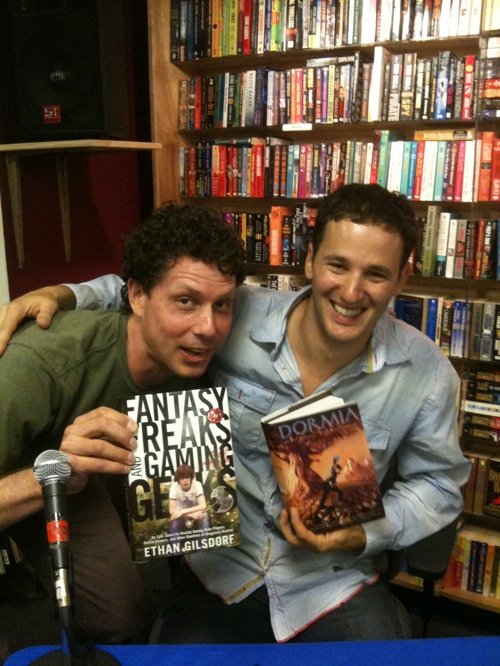 No longer 12 years old: Ethan Gilsdorf and Jake Halpern show off their books
No longer 12 years old: Ethan Gilsdorf and Jake Halpern show off their books
A Postmodern Kindle Book selling moment
What does an author do when a reader asks if his book is out on Kindle, and he says, "Yes," and then the reader says, "Great. So will you sign my Kindle?"
Not "Can you sign my book?"--- the physical book --- but the device.
Beth Davidson of Greensboro, North Carolina, met me at the gaming convention Gen Con in Indianapolis last weekend. I was posted at booth #221 (manning some prime corner real estate generously offered by the folks at Troll Lord Games) where I was selling my book Fantasy Freaks and Gaming Geeks. Beth wanted to take home a signed copy. But she didn't want one of the signed hardcopies my signage ("GIT YOUR AUTOGRAPHED COPIES HERE") was not-so-subtly promoting. She didn't want to buy a bound paper-and-print copy of the book. She wanted to download it on Kindle.
The e-book is a concept us old-fashioned writers are gradually getting used to (some of us more begrudgingly than others), but it's a conceptual leap we're all going to have to make.But here's the twist: how does this translate to a book signing. How do you "sign" a Kindle book? How does a reader walk away with that palpable evidence he or she met an author, engaged in small talk, and was handed over physical proof of the moment? In the Kindle world, this would seem impossible. And yet Beth really wanted the signature.
"Would you sign my Kindle?" she asked.
"Uh," I paused. "Sure! Why not?"
She opened her bag and took out her shiny Kindle 2. She flipped it over to reveal its pristine, stainless steel backside. It was the first time I'd held one in my hands. The device is slim: 1/3 of an inch thick, about the width of a pencil. I took out my black Sharpie. "You really want me to do this?" I asked.
"Yep, go ahead," Beth said.
I practiced on a piece of paper first, adjusted the size of my John Hancock, and signed away. It looked pretty close to what I'd hoped for (though I sort of flubbed the "D-O-R-F" of my last name). But I consoled myself: this was my first Kindle signing. Besides, Sharpie-on-steel has a different feel than pen on paper.
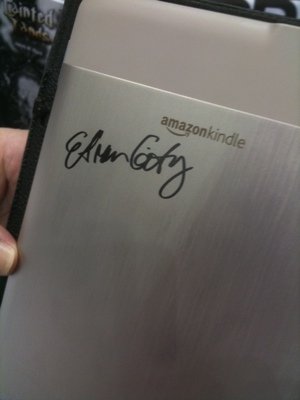
"Won't it rub off?" I wondered.
"When I get home, I'll paint it with clear nail polish." That would protect it.
Beth looked happy. She thanked me, I thanked her, and off she went into the crowds of gamers and geeks.
Immediately, alarms fired off in my head. "Is this the end of civilization as we know it?" I wondered. And then I pondered this irony: my book wasn't even loaded on her Kindle yet. I had signed an empty shell that will later be filled with a digital version of Fantasy Freaks and Gaming Geeks when she buys it online (and she better buy it).
Will the Kindle revolutionize reading? Will it change the way we consume books? Perhaps. But the fact that the Kindle and other e-book readers try to look like books, with "pages" that are digital approximations of real pages, proves that we're pretty old fashioned after all. The Kindle mirrors a real book, the real world. It still wants to be a book. The Kindle 2 is only a tool -- one of several tools --- to let us store our words and ideas.
Books were already highly efficient, functional, elegant, well-crafted objects. They didn't need an upgrade to be released as Book 2.0. But progress and the marketplace makes us want to reinvent what already works best. So be it.
Looking back on it, I found my Kindle book signing ultimately a heartening moment. Despite our electronic age of data streams and pixels, we still crave the concrete. We want that signature, that mark of chisel strike on stone, ink on paper, paint on canvas. That proof that I, and you, were there. We spoke, we laughed, we shook hands.
No digital signature or pixel-scape can ever replace that.
See Second Skin
To say that video games, particularly massively multiplayeronline games, are popular is like saying Oprah has decent Nielsen ratings. According to Strategy Analytics, in 2008 they generated $1.5 billion in wolrdwide subscription revenues, a figure that’s expected to balloon to at least $2.5 billion by 2012. Variously abbreviated as MMOs, MMOGs, and MMPOGs (or, if of the roleplaying kind, MMORPGs), these games have become an integral part of our social revolution and evolution, altering how we actand interact. But for good or evil?
This is the question I ask in my book "Fantasy Freaks and Gaming Geeks." And it's one asked by Juan Carlos and Victor Piñeiro Escoriaza, creators of the award-winning documentary Second Skin.
Every now and again, a film comes around that helps you understand your world a little better. Such is the case with Second Skin, a documentary that focuses on various groups computer gamers "whose lives have been transformed by online virtual worlds" -- be they addicted players, couples who meet and fall in love online; disabled players; or those toiling overseas as "gold farmers" to make digital goodies for richer (and western) players.
For the documentary "Second Skin," filmmakers took six months searching for subjects obsessed with online role-playing games. Eventually, they settled on four subjects, intercutting between them to explore the appeal of the massively popular "World of Warcraft" and "EverQuest" games.
Many potential subjects refused to participate, fearful of the geek label, said writer-producer Victor Piñeiro Escoriaza (in an article I wrote about them for the Boston Globe). He had to reassure them that he and his co-filmmakers were sympathetic gamers themselves. "We're emphasizing the human aspect of the people behind the game."
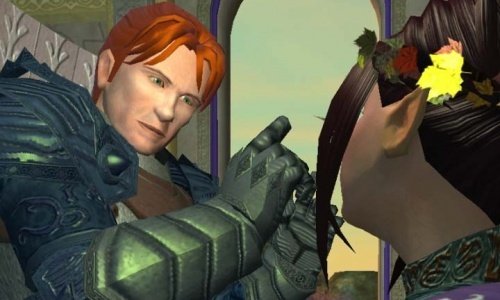
This month, Second Skin hits the theaters in Somerville (Boston); Austin, LA, and Colorado Springs. Check here for dates and showtimes in your town. In theaters August 7th. On DVD (with Liberation Entertainment) everywhere August 25th.
Roll for damage (extra bases)!
In an interesting piece in the NY Times about APBA, a board and dice baseball game is, if not going strong, at least holding its own against video and fantasy league versions of sports games. Like all great subcultures, it's got a devoted following; a recent tournament attracted 76 players. According to the article, "Video games have become increasingly sophisticated, and fantasy sports leagues have surged in popularity, but APBA, like its rival Strat-O-Matic, has stuck to the basic format that made it successful."
APBA, which once stood for "American Professional Baseball Association," is about as old-school as it gets: dice, cards, and dice shakers. And what's most interesting is this geeky twist on who plays--- yes, folks who self-identify as "nerds" and "geeks," lovers of statistics "in statistics-related careers like accounting, teaching math, tax law and financial advising." Nerdy sports nuts --- and as we know, sports is celebrated in our culture. Conjuring magic spells, not so much.Of course, with APBA, no dungeons or dragons are required --- just the fantasy of imagining a winning team (or playing center field for one). An acceptable fantasy for most boys, men (and girls and women, too).
The article points to an interesting turn, too. Brian Wells, the 16 year old kid who has won the tournament a couple times, has been "begrudgingly" accepted by the men. A kid's game is co-opted by adults who then let the kid back in as a member of their tribe.
But also this point -- can an old-school board game (or for that matter, a miniature soldier wargame) capture the imagination of kids when most are used to the spoon-fed action and eye-candy of XBox and Playstation? It's an issue I discuss in Fantasy Freaks and Gaming Geeks, specifically whether a wargame like Chainmail can entrance a 12 year old boy, or whether he's start craving Warcraft after the first hour of snail's pace action.
In the Times article, the kid says that his friends stay home with video games. “They don’t make fun of me,” Wells said. “But they don’t want to get into it. Because some of my friends just don’t have the attention span for all of this.”
Kirkus Reviews feature
FANTASY FREAKS AND GAMING GEEKS by Ethan Gilsdorf is featured in Kirkus Reviews’ “Big Book Fall Preview” section (Aug 1, 2009).
The full-color, center spread piece features the book’s cover art.
“Ethan Gilsdorf was made fun of a lot in high school. In the late ‘70’s, playing fantasy role-playing games like Dungeons & Dragons put the author in equal social footing as the AV club. Thirty years later, though, fantasy films rule the box office, J.R.R. Tolkien is considered essential reading and games like World of Warcraft are pop-culture phenomena. “When I was a teenager this stuff was looked down upon,” says Gilsdorf. “Now it’s everywhere.” But there are still pockets of fantasy culture – Lord of the Rings conventions, Society for Creative Anachronism battles, LARP (Live Action Role Playing) camps – that the casual fantasy nerd wouldn’t even dare to tread. But Gilsdorf, spurred on by the discovery of his old D & D guides, decided to dive elf-ears first into the deepest geek pools. “I wanted to know why a 40-year old man is still so interested in this stuff that he’d dress up in armor on the weekends,” he says. The author traveled from the woods of South Carolina to libraries in Wisconsin, from battlefields in Pennsylvania to the mountains of New Zealand – all in the quest to find some answers. His conclusion? They get to the heart of why any of us, geeks or not, become involved with any group. “It’s all about a sense of belonging,” says Gilsdorf. And maybe a bit about killing stuff. Fantasy Freaks and Gaming Geeks: An Epic Quest for Reality Among Role Players, Online Gamers, and Other Dwellers of Imaginary Realms (978-1-59921-480-1; September, 2009; $24.95; Hardcover) by Ethan Gilsdorf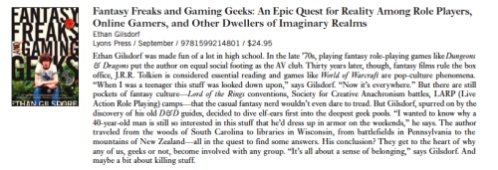
Proposed Gygax monument
As reported in the Janesville Gazette (WI) today, the family of E. Gary Gygax has announced plans for a memorial to Gygax in his hometown of Lake Geneva, Wisconsin, the town where Dungeons & Dragons was founded. (In Fantasy Freaks and Gaming Geeks, I head off to Lake Geneva in search of Gygax and his legacy.)
Apparently, Gygax was into the idea. And who wouldn't be? (and who wouldn't want to be memorialized in this way?). What would the monument look like? Perhaps a statue, perhaps something else. A maze? An animatronic wizards or dragon spewing fireballs? An endlessly rotating d20?
Upon hearing the news, in a spare moment at my local cafe (where much of my book was written), I scribbled down a possible design idea. Thoughts?
Lost Tolkien / Lewis manuscript notes found
Archives keep unearthing treasures. Texas State University recently announced that Steven Beebe, Regents’ Professor and Chair of the Texas State Department of Communication Studies, discovered the opening pages of an unpublished manuscript that C.S. Lewis and J.R.R. Tolkien were to collaborate on --- to be called Language and Human Nature. The pages were discovered in the Oxford University Bodleian Library.
According to the story, the partial book manuscript Beebe found was "in a small notebook on which Lewis had written the word “Scraps.” Included in the tattered notebook are early fragments of two Narnia Chronicles, The Magician’s Nephew and The Voyage of the Dawn Treader along with unpublished ideas about a variety of topics."
"What if two of the most famous and widely read 20th Century authors who have each individually sold millions of copies of their books had written a book together?" posits the University News Service. Interesting question.
In Fantasy Freaks and Gaming Geeks, I discuss my pilgrimage to Marquette University, in Milwaukee, Wisconsin, the heart of wargaming country, and an hour from Lake Geneva, where Dungeons & Dragons had been invented. Marquette's Department of Special Collections and University Archives has a J. R. R. Tolkien Collection that includes “holograph renderings (manuscripts in the hand of the author), various sets of typescripts with corrections by Tolkien, and page proofs or galley sheets, also with corrections in the hand of the author” of his major works, The Hobbit and The Lord of the Rings, plus two lesser works.
The recent publication of an old and near-vanished work by Tolkien, “The Legend of Sigurd and Gudrún," recently edited and published by J.R.R.T.'s son and literary executor, Christopher Tolkien, makes me wonder what other treasures remain in the Tolkien/Lewis universe, and what corners of their literary creations are still out there to be discovered.
geek camp in Boston
A couple years ago I reported on a martial arts studio in suburban Boston called Guard Up. Meghan Gardner, founder of the company, had begun to offer classes in Sport Sword. She and her instructors began playing with padded swords and ''armor" cobbled together from motocross, ice hockey, and lacrosse gear. They studied medieval sword-fighting and adapted the techniques to the nonlethal world of injection-molded plastic, Velcro, and spandex. They created a series of Sport Weapon programs, such as Sport Sword and Sport Armor, as well as kids' classes like Little Knights. I went there to learn how (and wrote about my meager efforts for the Boston Globe).
Last summer, in 2008, Gardner launched her Wizards and Warriors Camp, a sort of live-action role-playing adventure for kids, which I visited during the research of Fantasy Freaks and Gaming Geeks. This year she offers a day camp and overnight camp versions of the experience, which introduces kids to the concepts of role-playing. In a solid story, the Globe recently reported on this.
What I appreciate about what Gardner is doing is not simply that she's having campers stay in costume for the entire week, solve puzzles, and go on quests. Her camp counselors are teaching values such as camaraderie, honor, compassion and courage. And, in a way, she is indoctrinating a whole new generation of gaming geeks—only these geeks are running around outside, and they are learning how to kick ass with swords.
Harry Potter comes to Boston!
The Museum of Science in Boston made this announcement today:
"This fall, Harry Potter fans will get the chance to step inside the famous wizard's magical world through Harry Potter: The Exhibition, which opens at the Museum of Science, Boston on October 25, 2009, at 9 a.m. Tickets are now available online at mos.org or by calling 617-723-2500, 617-589-0417 (TTY). Visitors will be able to experience dramatic displays inspired by the Hogwarts™ film sets and see the amazing craftsmanship behind authentic costumes and props from the films. Harry Potter: The Exhibition will run in Boston through February 21, 2010."
Cool stuff includes "display Harry Potter artifacts in settings inspired by film sets, including the Great Hall, Hagrid's hut, and the Gryffindor common room" and "a 500-pound, 10-foot tall chess piece"
Great news. But it raises the question: what business does a science museum have displaying movie props and special effects displays? Don't get me wrong: I love these movie magic exhibits. The MOS hosted both a Lord of the Rings and Star Wars movie show. But I wonder if, in the words of Ioannis Miaoulis, President and Director of the Museum of Science, "This exhibit will spark their curiosity and imagination, leading them to experience the excitement of discovery that's also at the heart of the Museum's science and technology exhibits and programs."
Or maybe, just maybe, it will net the museum a crapload of money. Which isn't a bad thing. But I'd rather Miaoulis just call a spade a spade and say, hey, this is going to pay the heating bills and help update our cutting-edge technology displays that date back to the 1980s.
Hobbiton under construction
Yes, it's official. Despite on-going legal battles between filmmakers and the Tolkien family estate, it seems production on The Hobbit is moving forward -- with backhoes. TheOneRing.net and stuff.co.nz reports that "fruit trees are being planted, hedgerows are being groomed and new hillocks are being marked off as the sites of more hobbit homes."
 The site in Matamata, New Zealand does not yet seem blocked off, as the folks who operate tours of the Hobbiton movie set, ain't saying they are closed for business. Not yet anyway.
The site in Matamata, New Zealand does not yet seem blocked off, as the folks who operate tours of the Hobbiton movie set, ain't saying they are closed for business. Not yet anyway.
But the pictures of the backhoes etc suggest that the place is all torn up. In Fantasy Freaks and Gaming Geeks, I visit the Matamata Hobbiton set. You can also get a tour of the place from whence hobbit come in my video.
Newsweek and Penthouse sexing up the con scene
In an effort to reach out to the geek community, or perhaps as a nod to the fact that geeks ARE a force to be reckoned with, both Newsweek and Penthouse magazines recently posted articles attesting to the hotness of Comic-Con and other cons. Newsweek's piece sez: "Something about open-bar events, en-masse hotel bookings and spandex costumes just encourages people to pair (or triple) off."  And Penthouse journo Shari Goldhagen (in "sexy Robin" costume") wants to sex-up the con scene: "Once I get past the fact that my T&A are on display, there’s something exhilarating about being Robin. People line up to take photos with me. A pack of teenage boys hums the “dun nun ah dun nun ah” theme from the sixties TV show starring Adam West; I get three more marriage proposals than I’ve gotten in real life."
And Penthouse journo Shari Goldhagen (in "sexy Robin" costume") wants to sex-up the con scene: "Once I get past the fact that my T&A are on display, there’s something exhilarating about being Robin. People line up to take photos with me. A pack of teenage boys hums the “dun nun ah dun nun ah” theme from the sixties TV show starring Adam West; I get three more marriage proposals than I’ve gotten in real life."
A bit like my fond memories of Dragon*Con from last year. Frustrating ones, as I set off in search of a lady geek. You'll have to read about it in the book --- Fantasy Freaks and Gaming Geeks: An Epic Quest for Reality Among Role Players, Online Gamers, and Other Dwellers of Imaginary Realms.
The best fantasy franchise is...
Harry Potter?
According to a poll conducted by the website Moviefone and Bebo, Harry Potter has been voted the Best Fantasy Franchise in a new Internet poll. The result are striking: Harry got 73 per cent of votes, Lord of the Rings got 16, Twilight eight and lowly Chronicles of Narnia nabbed just three percent of the votes. Of course, this is probably a classic case of short-term cultural memory loss. Because of the frenzy surrounding the Half-Blood Prince release, everyone has Harry on the mind. Had you asked folks at the height of Rings mania back in 2001-2003, you might have gotten a much different answer. And probably fewer teenage girls voting. The other issue being, none of the news reports of this poll stated how the data was gathered, how many or who was surveyed, or anything else about the methodology. Maybe only catholic girls schools were targeted in online banner ads showing a half-naked Daniel Radcliffe.
--- Ethan Gilsdorf, author of Fantasy Freaks and Gaming Geeks
